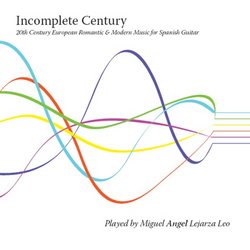A game of chess with death
Prof. Armando Aranda-Anzaldo | 10/28/2006
(5 out of 5 stars)
"In 1983 I was introduced to Miguel Angel Lejarza in London by Mr. Juan Leraicha, who a that time was running the famous Guitar Studio, perhaps the top London shop for quality guitars from world-famous luthiers. As a committed guitar "aficionado" I used to hang around the Studio located a few blocks away from the Wigmore Hall, in those years the hottest venue for classical guitar players from all over the world. Mr. Leraicha used to say "one of these days I will introduce you to this Mexican chap that comes here and tries all my guitars, you will see how raw and intense is this guy, so different from most players you listen at Wigmore Hall". And so one day I met Mr. Lejarza in the entrance hall of the Wigmore while waiting for a recital by Julian Bream. Indeed, at that time Lejarza was very much under the spell of the British Master whom Lejarza recognized as the true musician among the guitar players. With Lejarza I learned to fully appreciate the musicianship of Bream that was quite beyond his actual technique. So we struck a friendship that has lasted for many years but at the same time I discovered along our many meetings throughout the eighties (either in London or Cambridge), a very powerful musician, eager to play any guitar available (including my then current Korean mass-produced guitar) to the very limit of the instrument's capabilities. Yet very soon I also realized that as a performer Lejarza applied to himself the same mixture of recklessness and tenderness with which he approached the six strings. The result was always an intense musical experience, a tightrope act above the abyss, a promenade along the razor's blade, or perhaps like going down with Dante towards the "Inferno". And so in a typical evening with Lejarza I may shift from discovering a hidden beatitude in Moreno-Torroba's "Madroños" to an almost Heideggerian nihilism suddenly found in de Falla's "Homenaje, pour le tombeau de Claude Debussy ". Indeed, Lejarza's performances can reveal the tensions or more properly speaking the actual underworlds hidden behind some of the most well known set pieces of the modern guitar repertoire. Consider for example his versions of Villa-Lobos preludes that bring forth all the sensuality of a couple dancing, drinking and kissing in some humid, remote and dangerous paradise. Yet I think that Lejarza's rendering of William Walton's "Five Bagatelles" provide the rawest example of musicianship on the brink of collapsing or seen from the opposite, optimistic side, such a rendering shows how it is possible to bring order and beauty out from chaos. These five musical universes each in a nutshell, bear witness to Mr. Lejarza statement that any true musical performance is like playing a game of chess with death. I truly believe that Walton a respected but finally minor composer, was nevertheless touched by the highest muse when he wrote the "Bagatelles" that shall certainly outlast the composer's fame. And I truly believe that Lejarza exploits and explodes all the possibilities of the wooden hand-held orchestra while playing such Bagatelles that in his hands become a kind of gauntlet thrown down for others to pick the challenge of trying to defeat death by means of sheer beauty.
Prof. Armando Aranda-Anzaldo"


 Track Listings (18) - Disc #1
Track Listings (18) - Disc #1